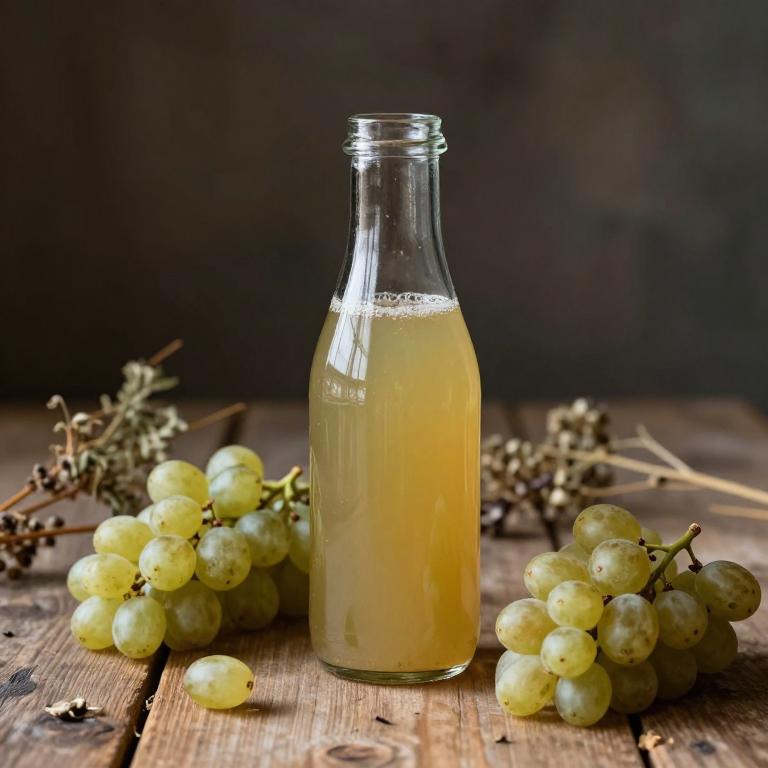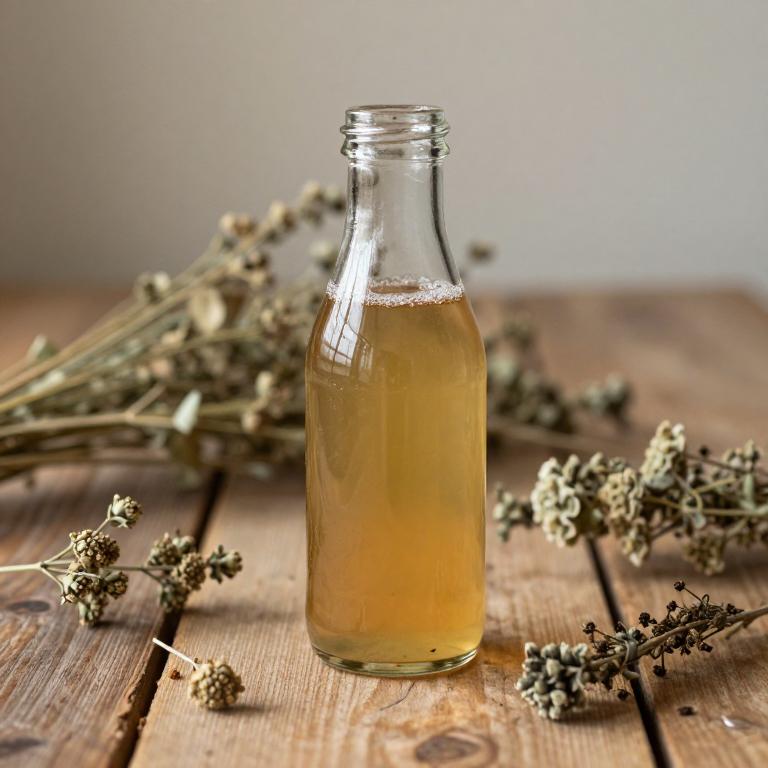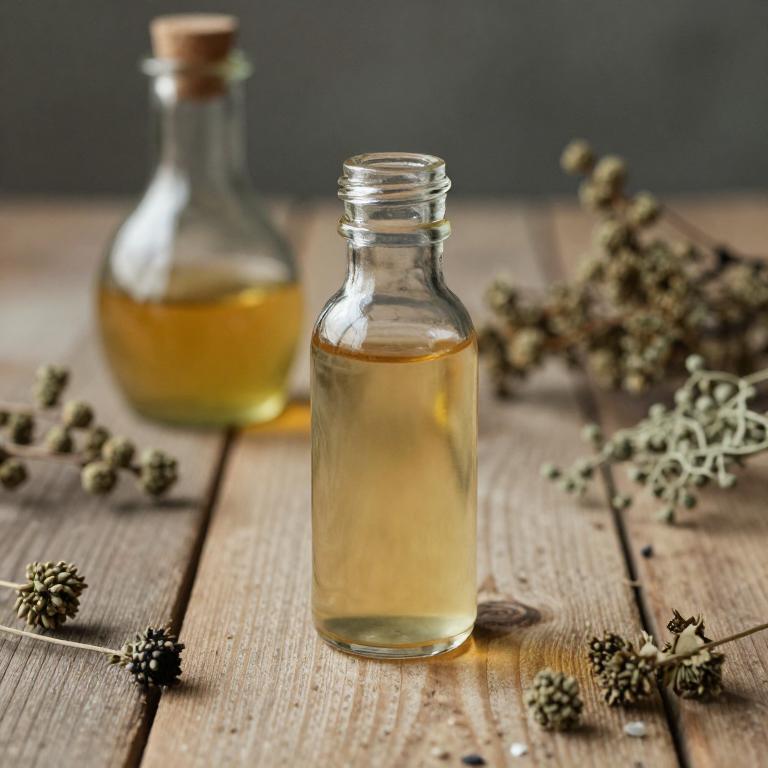10 Best Herbal Juices For Knee Pain

Herbal juices have gained popularity as a natural remedy for knee pain, offering a gentler alternative to conventional treatments.
Ingredients like turmeric, ginger, and boswellia are commonly used in these juices due to their anti-inflammatory and pain-relieving properties. Turmeric contains curcumin, which has been shown to reduce inflammation and improve joint mobility, while ginger helps alleviate pain and enhance circulation. Boswellia, also known as frankincense, supports joint health by reducing inflammation and promoting tissue repair.
Although herbal juices may provide some relief, they should not replace professional medical advice, and individuals should consult a healthcare provider before incorporating them into their treatment plan.
Table of Contents
- 1. Salvia (Salvia officinalis)
- 2. Turmeric (Curcuma longa)
- 3. Ginger (Zingiber officinale)
- 4. Common grape (Vitis vinifera)
- 5. St. john's wort (Hypericum perforatum)
- 6. Thistle (Silybum marianum)
- 7. Yarrow (Achillea millefolium)
- 8. Field horsetail (Equisetum arvense)
- 9. Blessed thistle (Cnicus benedictus)
- 10. Indian frankincense (Boswellia serrata)
1. Salvia (Salvia officinalis)

Salvia officinalis, commonly known as sage, has been traditionally used for its medicinal properties, and its herbal juices are gaining attention for their potential benefits in alleviating knee pain.
Rich in antioxidants, anti-inflammatory compounds, and essential oils, sage juice may help reduce inflammation and oxidative stress in the joints, which are often associated with conditions like osteoarthritis. Some studies suggest that the bioactive compounds in sage, such as rosmarinic acid and flavonoids, may support joint health and ease discomfort. While more research is needed to confirm its efficacy, many individuals report relief from knee pain after incorporating sage juice into their wellness routine.
As a natural alternative, sage herbal juice offers a promising option for those seeking holistic approaches to managing knee pain.
2. Turmeric (Curcuma longa)

Curcuma longa, commonly known as turmeric, contains a bioactive compound called curcumin, which is widely studied for its anti-inflammatory and antioxidant properties.
Herbal juices made from turmeric root can be a natural alternative for individuals seeking relief from knee pain caused by conditions like osteoarthritis or rheumatoid arthritis. These juices work by reducing inflammation and oxidative stress in the joints, which may help alleviate pain and improve mobility. To enhance absorption, turmeric is often combined with black pepper or healthy fats in herbal formulations.
While generally safe, it is advisable to consult a healthcare professional before using turmeric juices, especially if you are on medication or have existing health conditions.
3. Ginger (Zingiber officinale)

Zingiber officinale, commonly known as ginger, has been traditionally used for its anti-inflammatory and analgesic properties, making it a popular ingredient in herbal juices for managing knee pain.
These juices typically combine fresh ginger root with other beneficial herbs like turmeric, garlic, and holy basil to enhance their therapeutic effects. The active compounds in ginger, such as gingerol and shogaol, help reduce inflammation and improve joint mobility, providing natural relief for individuals suffering from arthritis or chronic knee discomfort. Regular consumption of ginger-based herbal juices may support long-term joint health and reduce the need for pharmaceutical pain relievers.
However, it is advisable to consult a healthcare professional before incorporating these juices into a treatment regimen, especially for those with existing medical conditions or on medication.
4. Common grape (Vitis vinifera)

Vitis vinifera, commonly known as the grape vine, has been traditionally used in herbal medicine for its potential anti-inflammatory and antioxidant properties.
Herbal juices derived from Vitis vinifera, particularly from its leaves and berries, are believed to support joint health and may help alleviate symptoms of knee pain. These juices contain compounds like resveratrol and flavonoids, which may reduce inflammation and oxidative stress in the body. Some studies suggest that regular consumption of Vitis vinifera herbal juice could complement conventional treatments for knee pain by promoting cartilage repair and reducing discomfort.
However, it is important to consult with a healthcare professional before incorporating these juices into a treatment plan, as individual responses and interactions with other medications can vary.
5. St. john's wort (Hypericum perforatum)

Hypericum perforatum, commonly known as St. John's Wort, has been traditionally used for its potential anti-inflammatory and analgesic properties, making it a popular herbal remedy for knee pain.
When prepared as a herbal juice, it may help reduce inflammation and alleviate discomfort associated with conditions like osteoarthritis or rheumatoid arthritis. The active compounds in hypericum perforatum, such as hypericin and hyperforin, are believed to contribute to its therapeutic effects by modulating neurotransmitters and reducing oxidative stress. However, it is important to consult a healthcare professional before using St. John's Wort juice, as it can interact with certain medications and may cause side effects in some individuals.
Overall, while some people find relief from knee pain using hypericum perforatum herbal juice, its effectiveness can vary, and it should be used as part of a comprehensive treatment plan.
6. Thistle (Silybum marianum)

Silybum marianum, also known as milk thistle, is a herbal remedy that has been traditionally used for its potential anti-inflammatory and antioxidant properties.
While it is commonly associated with liver health, some studies suggest that silybum marianum may also help reduce inflammation and support joint health, making it a possible natural option for individuals suffering from knee pain. Herbal juices made from silybum marianum are believed to provide a concentrated form of its active compounds, such as silymarin, which may help alleviate discomfort and promote healing in the knees. However, it is important to consult with a healthcare professional before using these juices, especially if you are taking other medications or have existing health conditions.
Despite its potential benefits, more research is needed to fully understand its effectiveness and safety for treating knee pain.
7. Yarrow (Achillea millefolium)

Achillea millefolium, commonly known as yarrow, has been traditionally used for its potential anti-inflammatory and analgesic properties, making it a candidate for natural remedies for knee pain.
Herbal juices made from achillea millefolium may help reduce swelling and discomfort associated with conditions like arthritis or sports injuries. While scientific evidence supporting its efficacy for knee pain is limited, some studies suggest that compounds in yarrow, such as sesquiterpene lactones, may have mild anti-inflammatory effects. These juices are often prepared by combining fresh or dried yarrow with other herbs or citrus juices to enhance flavor and bioavailability.
As with any herbal remedy, it is important to consult a healthcare professional before use, especially for individuals with existing health conditions or those taking medications.
8. Field horsetail (Equisetum arvense)

Equisetum arvense, commonly known as field horsetail, has been traditionally used in herbal medicine for its potential anti-inflammatory and pain-relieving properties.
The plant contains high levels of silica, which may contribute to its ability to support joint health and reduce inflammation. Some herbal practitioners recommend preparing a juice from fresh equisetum arvense to help alleviate symptoms of knee pain. However, it is important to note that while some anecdotal evidence supports its use, scientific research on its effectiveness for knee pain is limited.
As with any herbal remedy, it should be used under the guidance of a qualified healthcare professional to ensure safety and proper dosing.
9. Blessed thistle (Cnicus benedictus)

Cnicus benedictus, commonly known as St. John's Wort, is a herbal remedy that has been traditionally used for its potential anti-inflammatory and analgesic properties.
While it is more widely recognized for its effects on mood disorders, some studies suggest that its active compounds, such as hypericin and hyperforin, may help reduce inflammation and pain in the joints. Herbal juices made from Cnicus benedictus are often consumed to support joint health and alleviate symptoms of knee pain. However, it is important to consult with a healthcare professional before using this herb, as it can interact with certain medications and may not be suitable for everyone.
Despite its traditional use, more clinical research is needed to fully understand its efficacy and safety for treating knee pain.
10. Indian frankincense (Boswellia serrata)

Boswellia serrata, also known as Indian frankincense, is a herbal remedy that has been traditionally used for its anti-inflammatory properties.
When consumed as a juice, it may help reduce inflammation and pain associated with knee conditions such as osteoarthritis. The active compounds in Boswellia serrata, such as boswellic acids, are believed to inhibit inflammatory responses in the body. Some studies suggest that regular consumption of Boswellia serrata juice may improve joint mobility and alleviate discomfort.
However, it is important to consult with a healthcare provider before incorporating this herbal juice into a treatment plan for knee pain.